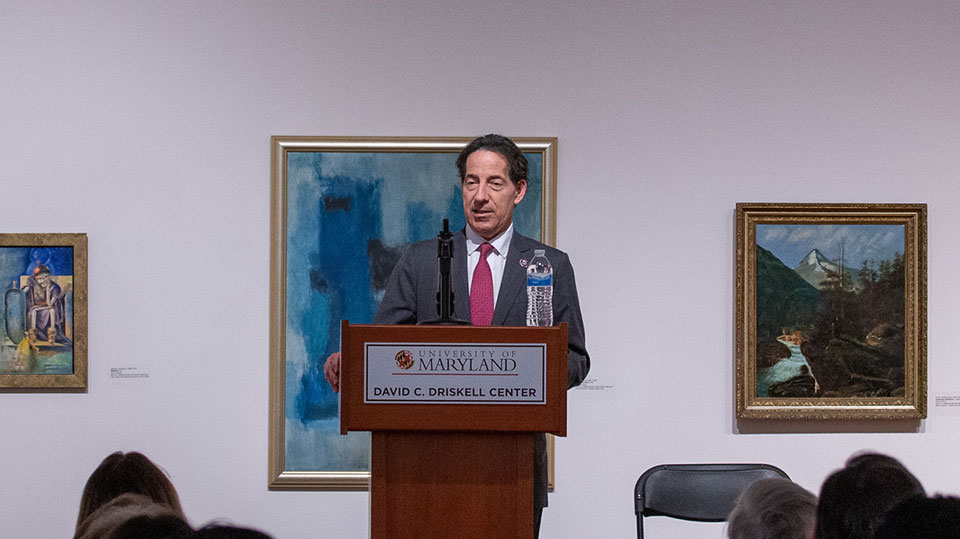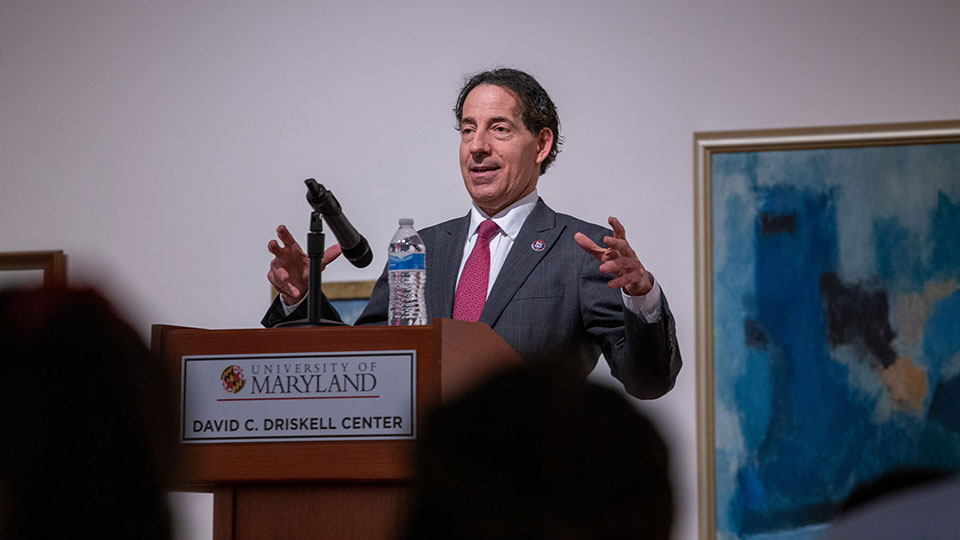
Ethics and politics aren’t terms that we often associate with each other. However, Congressman Jamie Raskin, US Representative for Maryland’s 8th Congressional District, is optimistic that, through constitutional patriotism and going back to our democratic roots, we can change that.
“Constitutional patriotism relies on the idea that we demonstrate our commitment to the Constitution over our own ambitions,” Raskin said. “This idea upholds that our democracy was created by the people for the people. We need to solidify our ethical foundations by promoting this idea of constitutional patriotism.”
As part of the 2022 Fishlinger Family Lecture, sponsored by the Center for the Study of Business Ethics, Regulation, and Crime (C-BERC) – a joint Center of Excellence of Maryland Smith and the College of Behavioral and Social Sciences, Raskin delivered his reflections on ethical leadership in business and politics and how we can move forward as a country.
In the early days of our democracy, many of the founding fathers denounced partisanship with Thomas Jefferson famously saying “If I could not go to heaven but with a party, I would not go there at all.”
However, Raskin points out that despite these denouncements, the founders were all actively involved in their respective political parties.
“The founders knew that partisanship was endemic in human nature,” said Raskin. “We can’t be so high-minded about political parties that we don’t recognize the role they play. The time for realism with partisanship is if we can overcome the dangers of partisanship.”
To overcome the dangers of partisanship, Raskin made two suggestions. First, give partisanship its due and be realistic about its role. Second, recognize when it becomes dangerous.

To the first point, Raskin highlighted the benefit of partisanship as a sign of political health.
“Disagreements being expressed are signs that our first amendment rights are being exercised in a healthy way,” Raskin said. “Political parties help us to organize votes, educate people and advance the legislative agenda people voted for during an election. We wouldn’t want to completely get rid of political parties.”
The real problem with ethics in partisanship, Raskin said, comes when the interest of the party is expressed over the people being represented.
“We all know how to be non-partisan when we need to,” Raskin said. “The question becomes, can we transpose this to the legislative process?”
Additionally, Raskin emphasized the need to make improvements to our democratic processes to allow for more ethical congressional operations.
“Some outdated practices such as the filibuster and gerrymandering are a real threat to our constitutional process,” Raskin said. “These practices give us extreme and narrow politics and need to be addressed in order for us to have a more fair and ethical democratic process.”
Overall, Raskin emphasized the importance of working together to defend the ethical framework that is part of our constitutional democracy.
“Stop saying ‘they need to come up with better laws, start saying ‘we need to come up with better laws,’” Raskin said. “Being a part of the political process can help to actively combat cynicism and doubt from both foreign and domestic entities.”
Media Contact
Greg Muraski
Media Relations Manager
301-405-5283
301-892-0973 Mobile
gmuraski@umd.edu
About the University of Maryland's Robert H. Smith School of Business
The Robert H. Smith School of Business is an internationally recognized leader in management education and research. One of 12 colleges and schools at the University of Maryland, College Park, the Smith School offers undergraduate, full-time and flex MBA, executive MBA, online MBA, business master’s, PhD and executive education programs, as well as outreach services to the corporate community. The school offers its degree, custom and certification programs in learning locations in North America and Asia.